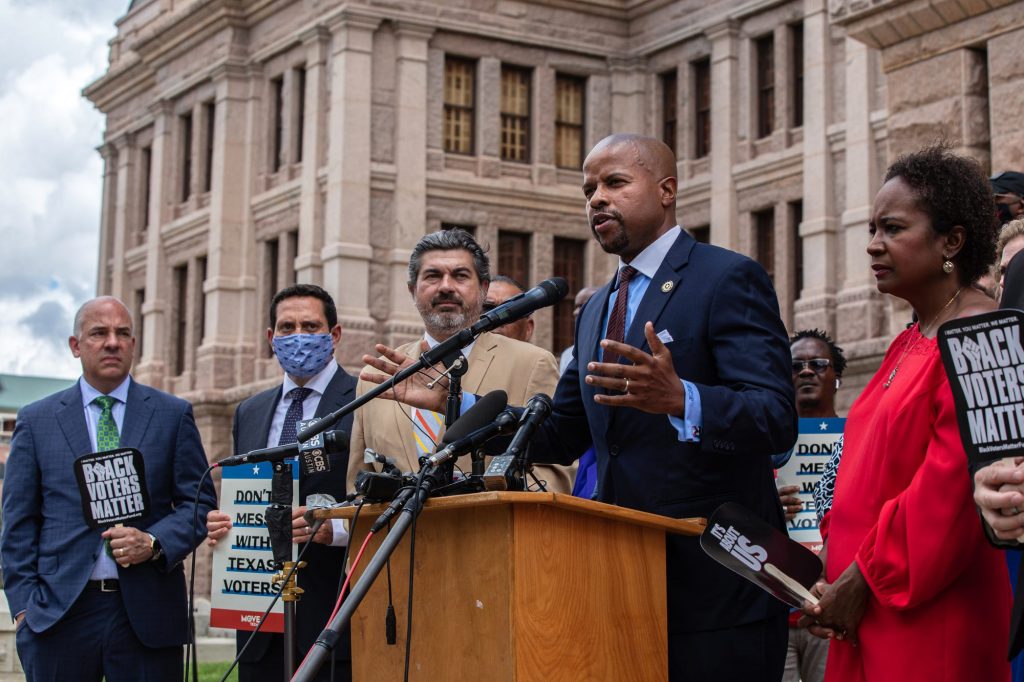
Tamir Kalifa/Getty Images
- Texas Democratic lawmakers have weighed leaving the state over the GOP election bill, per the NYT.
- In May, Democrats were able to temporarily halt passage of the bill by denying Republicans a quorum.
- Republican Gov. Greg Abbott has made the election overhaul a top priority this year.
- Sign up for the 10 Things in Politics daily newsletter.
Texas Democratic lawmakers are reportedly weighing a decision to leave the state to block a Republican-backed election overhaul from passing, according to The New York Times.
Individuals with knowledge of the situation told The Times that there have been talks surrounding how Democrats could leave the state to protest the new voting restrictions, but it would only be a temporary maneuver.
The lawmakers who support leaving the state have argued that the action "would bring a renewed spotlight to voting rights in Texas" and put pressure on Democrats in the US Senate to enact federal voting reforms, according to several Democratic lawmakers who spoke with The Times.
However, a contingent of Democrats oppose leaving the state, calling on members to remain at the state Capitol in Austin and battle with Republicans over the bill.
Texas House Democrats on Friday tussled with several options – leaving Texas for a month, which would prevent Republicans from having a quorum; staying in the Lone Star State and seeking amendments to weaken the bill; or allowing a vote and making a decision on how to proceed while the bill is being hashed out by the state House and Senate.
Read more: 20 sought-after female political strategists to watch as more women in the US enter politics
Texas Democratic senators on Friday filed the Barbara Jordan Fair Elections Act, named after the revered Black congresswoman who served in the US House from 1973 to 1979, which would expand access to voting, allowing for online and same-day voter registration and automatic voter registration, among other measures, according to The Dallas Morning News.
The actions come as Texas legislators enter a special session to pass the election overhaul that failed in May after House Democrats denied Republicans a quorum and temporarily halted passage of the bill.
In response to the move, GOP Gov. Greg Abbott effectively defunded the Texas legislature.
However, Texas legislators have moved to restore the funding, according to The Texas Tribune.
The Republican election overhaul modifies early voting hours, curbs the 24-7 voting centers that were popular with shift workers in last year's presidential election, and scraps straight-ticket voting, among other rules.
The legislation could be passed as soon as Tuesday, according to The Times.
After former President Donald Trump's loss to now-President Joe Biden, Republican legislators across the country sought to enact a wide range of voting restrictions, under pressure from the former president and conservative activists to prioritize election integrity, despite there being no verifiable evidence of mass fraud in the 2020 election.
Arizona, Florida, and Georgia, Sun Belt states that are competitive on the presidential level, have all passed controversial voting bills this year.
Last month, the Department of Justice announced that it was suing the state of Georgia over its new voting law, SB 202, citing "racially discriminatory provisions."
"The right to vote is one of the most central rights in our democracy and protecting the right to vote for all Americans is at the core of the Civil Rights Division's mission," said Kristen Clarke, the Assistant Attorney General for the Civil Rights Division. "The Department of Justice will use all the tools it has available to ensure that each eligible citizen can register, cast a ballot, and have that ballot counted free from racial discrimination. Laws adopted with a racially motivated purpose, like Georgia Senate Bill 202, simply have no place in democracy today."
